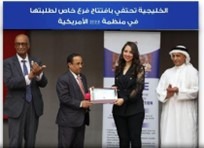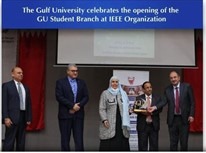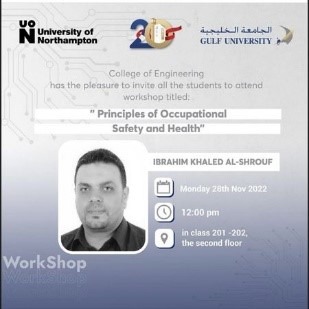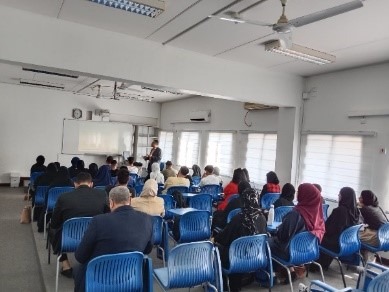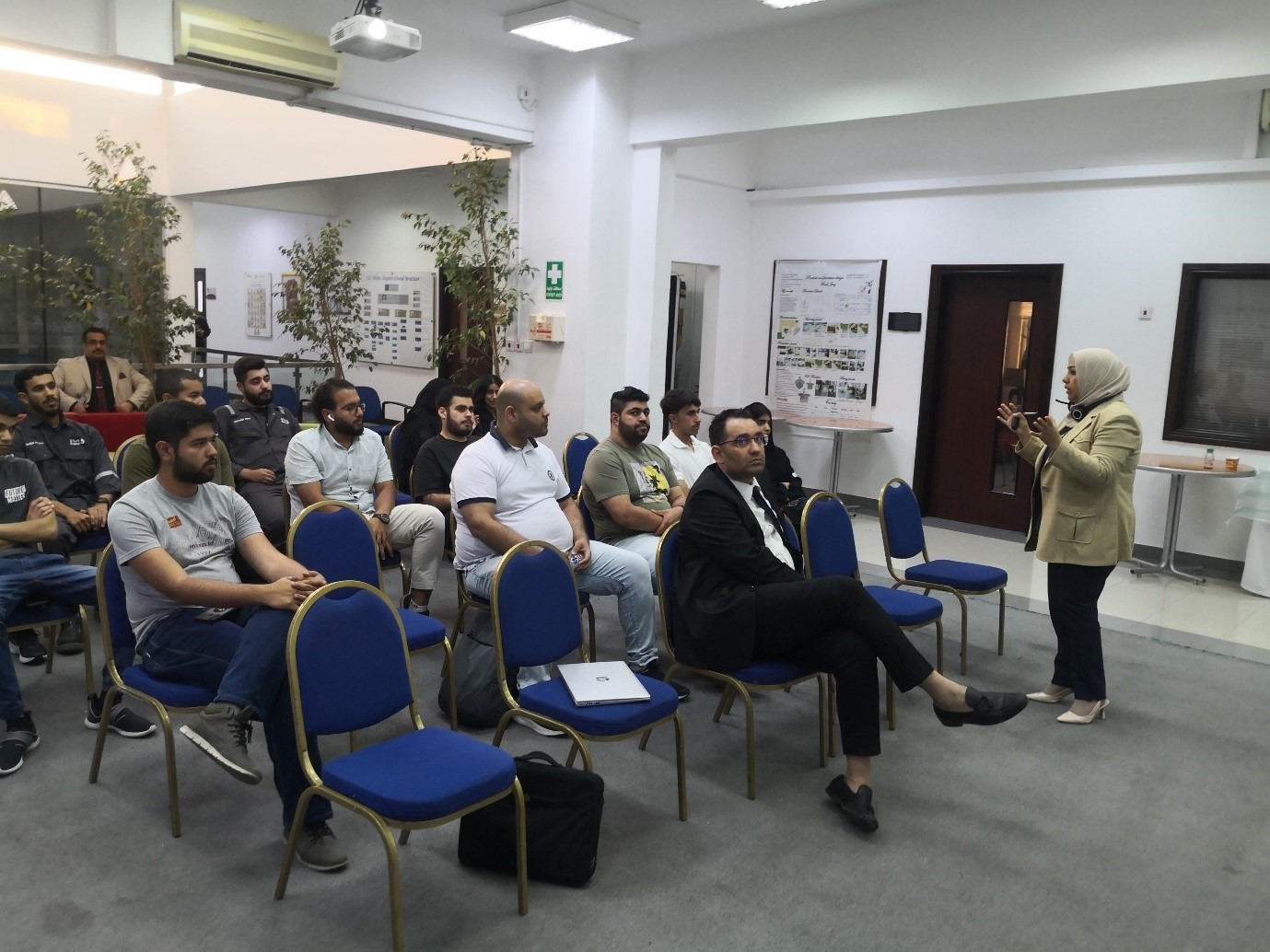Overview
A fast-growing economy is one of the main reasons why Electrical and Electronic Engineering is one of the most sought-after disciplines in Bahrain and the Gulf Region. The BEng (Hons) Electrical and Electronic Engineering program is a blend of theory and practice which provides you with knowledge, skills, and attributes, relevant to electrical and electronic engineering, design and simulation, computing and programming, control systems, and embedded systems. It investigates sustainability and innovation within industry and business practice. The program prepares you for a successful career, empowering you to drive the industry forward and make change for good in the engineering world. The program supports you to identify the skills acquired, strengthening, and gaining practical experience. The program is designed to meet the requirements of the QAA Engineering Benchmark (2015) and the UK Standard for Professional Engineering Competence (UK-SPEC).
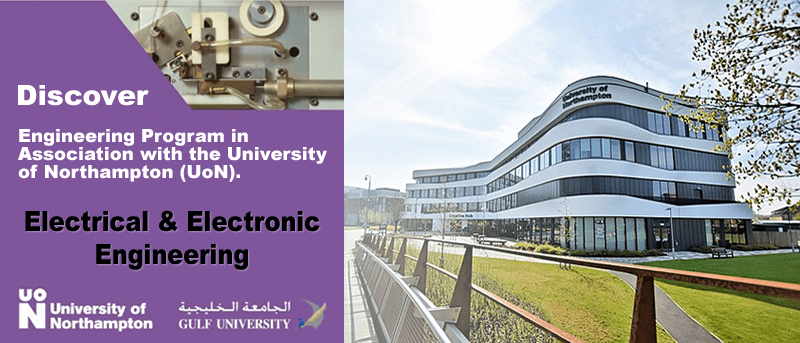
Highlights
- Receive engineering degree from the University of Northampton while studying in Bahrain.
- Explore the opportunity to complete one or two semesters in the UK campus, University of Northampton.
- Get hands-on and experiential learning through state-of-the-art labs and workshops.
- Access learning resources of the University of Northampton and Gulf University while studying in Bahrain.
- Enrich the learning experience through highly qualified, experienced, and diverse faculty from both universities.
- Experience high-quality education in the UK system at affordable cost with scholarships up to 30% on course fees.
- National Partnership with reputed companies in the Kingdom of Bahrain, such as Bahrain Fab Lab.
- Obtaining membership with Professional bodies such as IEEE.
Discover Our Campus
Key Facts
| Level: | 8 NQF |
|---|---|
| Duration: | Full Time: 130 Credit Hours |
| Track: | English |
| Starting: | September (Fall)
January (Spring) May (Summer for transferred students) |
| Fees: | TBA |
| Location: | Sanad |
Get In Touch
For questions regarding study and admissions please contact us:
Phone:
(+973) 1762 0092
Email:
[email protected]
Address:
Building 1964, Road 4363، Sanad 743, Kingdom of Bahrain
Graduate Attributes
- Engineering Professionalism: Graduates will be able to understand and apply ethical principles and adhere to professional ethics, responsibilities, and norms of engineering technology practice.
- Teamwork and Communication skills: Graduates convey ideas and information to various audiences for various purposes and contribute positively and collaboratively to achieve common goals.
- Lifelong learner: Graduates will be able to educate themselves and keep up to date with contemporary issues and recent trends in mechanical Engineering programs with life-long learning through well-developed learning skills.
- Creative and critical thinking, and problem-solving: Graduates are effective problem-solvers who can apply critical, creative and evidence-based thinking to conceive innovative responses to future challenges.
- Design and implementation: Graduates will have the ability and skills to design and implement different engineering projects and applications in all aspects of their specialization.
- Economics and project management: Graduates can use appropriate modern engineering technologies, resources, and tools, including information technology, to solve precisely defined engineering problems while being mindful of limitations.
- Impact of engineering on society and the environment: Graduates will implement the knowledge gained in integrating sustainable ideas and practices into all aspects of their lives.
Program Content
Careers & Employability
The program creates opportunity for careers in a number of different sectors including manufacturing, pharmaceutical, automotive, aerospace, IT and telecommunications, energy and utilities.
The graduates are contributing to following career opportunities in the field of Electrical & Electronic Engineering:
- CAD engineer
- Signal Processing Engineer
- Power Electronics Engineer
- Aerospace engineer
- Automotive engineer
- Electrical/Electronic Design engineer
- Site engineer
- Project engineer
- control system engineer
- solar/renewable Energy Engineer
- Mechatronics Engineer
- Quality assurance/quality control engineer
- Power system engineer
- Machine learning and programming
- Engineering problem-solving and programming
- Embedded Systems Engineer
- Planning engineer
- Production engineer
- Telecommunications Engineer Engineering supervisor
- Research and Development Engineer
Our graduates are also encouraged to pursue postgraduate studies in Electrical & Electronic engineering or related field.
130 credit hours, divided into 8 semesters (4 years).
Bachelor in Electrical & Electronic Engineering Study Plan (Click to download).
- Applicant must have a high-school certificate or an equivalent, or a certificate from applied technical or industrial institutes or an equivalent, according to the regulations of the Ministry of Education in the Kingdom of Bahrain.
- The high-school certificates must be in one of the following branches-Science, Commercial, Industrial, with a GPA of no less than 60%.
- Applicants with GPA equal to or greater than 60% must sit for, and pass in placement tests, and if they fail, they must enrol in relevant preparatory courses, which are of (3) credit hours each.
The following are the placement tests for the Foundation Year of BEE and BME Programs and relevant preparatory course(s) to be enrolled in, if applicants fail in placement test(s):
- Basic Engineering Mathematics:
Pass Mark for Mathematics test is 65%. If the Applicant scores less than 65%, s/he is required to enrol in the Preparatory Course (MTH015 Basic Mathematics for Engineering). - Basic Physics:
Pass Mark for Basic Physics test is 65%. If the Applicant scores less than 65%, s/he is required to enrol in the Preparatory Course (PHY010 Basic Physics). - Computer Skills:
Pass Mark for Computer Skills test is 65%. If the Applicant scores less than 65%, s/he is required to enrol in the Preparatory Course (CS011 Computer Skills). - English Language Proficiency:
Pass Mark for English Language Proficiency test is 65%. If the Applicant scores 40% to less than 65%, s/he is required to enrol in the following Preparatory Course (ENG016 Foundation English 2). If the Applicant scores less than 40%, s/he is required to enrol in the following two Preparatory Courses (ENG015 Foundation English 1 and ENG016 Foundation English 2).
- Basic Engineering Mathematics:
- Applicants with GPA less than 60% shall directly enrol in a preparatory program before enrolling in any of the Core Courses of the Foundation Year Schedule (defined in Article 5.3.1 of this document). The preparatory program shall include the following preparatory courses:
- MTH015 – Basic Mathematics for Engineering,
- PHY010 – Basic Physics,
- CS011- Computer Skills,
- ENG015 – Foundation English 1,
- ENG016 – Foundation English 2.
- However, applicants can enrol in other courses of the Foundation Year schedule in addition to the required preparatory course(s) within the maximum academic load of the student as stated in GU Enrolment Procedures.
The Electrical and Electronic Engineering degree program is offered in four years including the foundation year. Applicants must complete first the foundation year, then s/he is eligible to enrol in UON curriculum with courses in stage 1, 2 and 3.
The foundation year (first year) offers a range of courses with transferable skills and an opportunity to improve on your knowledge content for relevant Engineering, Mathematics, and University General courses.
In year 2 and 3, students will develop their ability and confidence to assess and analyze different situations in engineering, focusing on the electrical and electronic aspects.
STAGE 1 (year 2):
- Computer Systems
- Mathematics for Engineers
- Engineering Industry Practice
- Introduction to Engineering Design
- Problem Solving and Programming
- Electrical and Electronic Principles
STAGE 2 (year 3):
- Advanced Mathematics for Engineers
- Analogue and Digital Electronics
- Control Systems
- Electromagnetism for Engineers
- Microprocessor Systems
- Industrial Appreciation
Final year gives the opportunity to direct the studies towards interest and passion of the students as s/he can choose from a range of courses. Students will complete the graduation project in the chosen topic under the supervision of faculty in relevant specialization.
STAGE 3 (year 4):
- Advanced Electro-mechanical System Design
- Digital Signal Processing
- Lean Manufacture and Quality Applications
- Advanced Digital Electronics
- Engineering Project
-
- BHD 180 per credit hour.
The Total amount before Discount BHD 23,400 and Gulf University provide to the student’s scholarship according to their high school GPA as shown in below tables:
|
High School |
Scholarship |
Fees per 1 Cr. |
Total Amount After Discount |
|
GPA ≥ 85% |
33% |
121 BHD |
15,730 BHD |
|
80% – 84.9% |
25% |
135 BHD |
17,550 BHD |
|
70% – 79.9% |
20% |
144 BHD |
18,720 BHD |
Available Facilities Contributing to the BEE Program:
- Electric Circuits Lab
- Electrical Machines Lab (DC & AC Machines)
- Electronics Lab
- Digital Electronics Lab
- microprocessor lab
- Communication Lab
- Power Electronics Lab
- Control Systems Lab
- Material Testing Lab
- Engineering Drawing Studios
- General Computer Labs
- Classrooms
- Lecture Hall
- Seminar Room
- Open Space Lecture Zone 1
- Open Space Lecture Zone 2
- Auditorium
- Library Resources
- Electronic Library Resources
Gulf University international bachelor graduates are eligible to study Master degree in any local and international university.
The BEE program contains two internships (Internship I and Internship II). In the first one, the student should complete 100 hours after finishing 40% of the total credit hours. For the second internship, the student should complete 200 hours after completing 70% of the total credit hours. Every student takes up an assigned task related to their field of study in a firm of relevant specialization under the guidance of an internal faculty and the supervision of an external field supervisor. As for the internship, 40% of the marks are assessed by the field supervisor, 30% by the academic supervisor, and 30% by the internship jury panel.
| GU-IEEE Students Branch Ceremony | • Gulf University’s opening ceremony of GU-IEEE students branch, 13th of march • Fab-Lab Bahrain Site Visit • Al-Salam Site Visit • Engineering on Future of Teaching and Education in Post COVID-19 Era (IFFTE 2022) • IDE International Conference First Edition 2022 On Engineering and Technology for Sustainable Architectural and Interior Design Environments (ETSAIDE), will be published in IEEE proceeding. • Guest speaker from University of Northampton, UK, Topic “Engineering Implementation for shining Future and Sustainable Society” |
|
| Northampton Guest Speaker | GU organized for an online activity in collaboration with the Northampton University, UK, by inviting Dr. Mohammad Ghaleeh, one of the UON staff in the Mechanical Engineering Department. The purpose is to share with the students the tips about the Engineering Implementation for shining future and sustainable society. Dr. Ghaleeh shared his wide experience related to this field, moreover the Engineering Students were exposed to the latest sustainability trends. |  |
| Engineering Guest Speaker | The college of engineering arranged for a class activity for the engineering students Topic: Principles of Occupational Safety and Health Presenter: Eng. Ibrahim Alshrouf |
|
| UON-GU Students Induction Regulations and Policy | GU organized in collaboration with UON an students online induction to review the Regulations and Policy of Northampton University which will be presented by Ms. Vicki from Northampton University on Monday 28th NOV. 2022 at 03:00 pm. |
|
| Why should I attend GU for the Electrical and Electronic engineering program? What distinguishes GU’s program from other institutions? | We are offering you to receive a degree from a prestigious UK University while studying in Bahrain with options to complete one or more semesters on the UK campus. The program prepares you for a successful career, empowering you to drive the industry forward and make change for good in the engineering world. The program supports you to identify the skills acquired, build on your strengths and gain practical experience. |
| What nontechnical skills does an Electrical and Electronic Engineering education at GU provide? | Further, than technical skills, an Electrical and Electronic engineering program at GU will offer students with Creative and critical thinking, and problem-solving, teamwork and Communication skills besides Engineering Professionalism where the principles and adhere to professional ethics, responsibilities, and norms of engineering technology practice. |
| What is the total credit of the Electrical and Electronic Engineering program? | the total credit of the program is 130 Cr. |
| How long is the study period in this program? | 4 years, the first year is a foundation courses year and the 2nd, 3rd, and 4th years are the UON core courses |
| What are the different types of disciplines in Electrical and Electronic engineering? |
|
| What do Electrical and Electronic engineers do? | Electrical and Electronic engineers deal with the Principles of Electrical and Electronic design and simulation, materials science, control systems, thermo-fluids, corrosion and condition monitoring, as well as investigating sustainability and innovation within the industry and business practice. |
On-site:
IT Support Office
1st Floor
08:00 AM – 04:00 PM
Online:
Email: [email protected]
Phone: +973 1762 0092 – Extensions 111 – 112 – 113
WhatsApp: +973 3563 3610
Student Story
Wejdan Salah's Story
“Taking a work placement is one of the best decisions I have ever made. It enabled me to have the opportunity to look thoroughly into the HR industry, to develop an understanding of the structure, behaviour and working norms within an organisation, as well as improving my verbal and written communication skills.
The placement has played a key role in determining what career I would like to pursue, I am now confident as to what I would like to do after graduating. I feel like I now have an advantage on expanding my network in the HR sector. This placement has also had a huge impact on my personal development – a year ago, I was a shy individual whereas now I am more confident and can see the transformation within myself.”
Related Programs
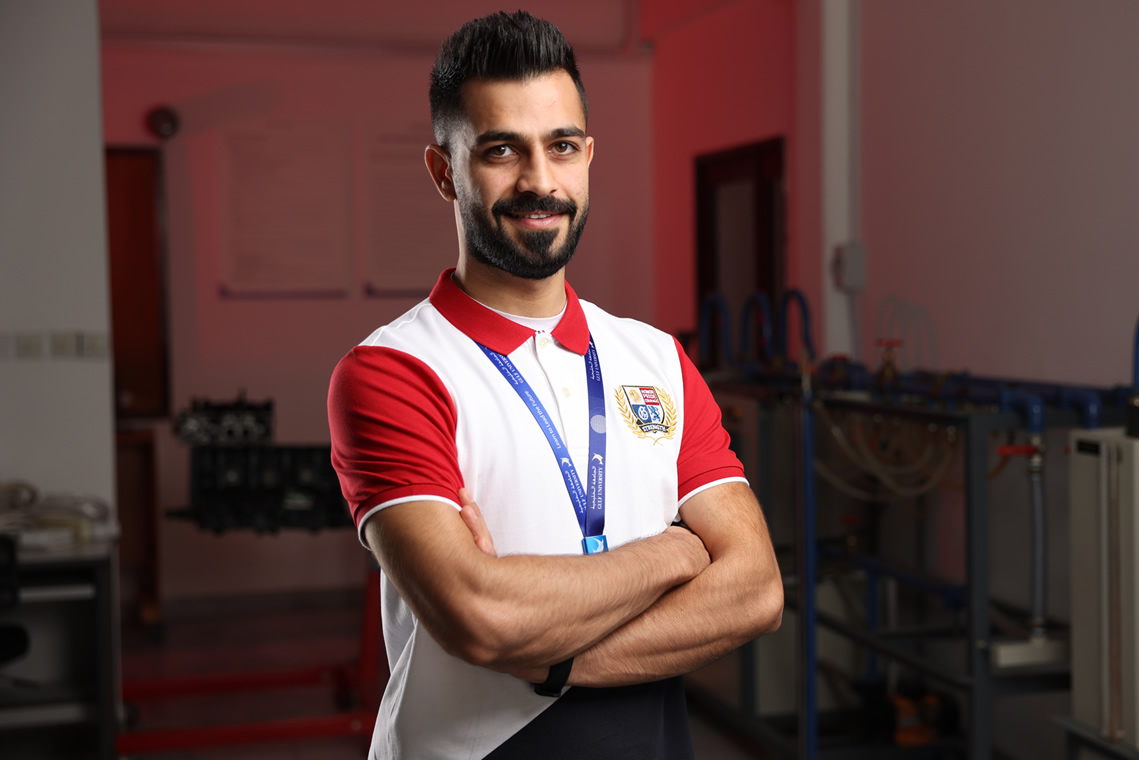
Mechanical Engineering
Receiving a degree from a prestigious UK University while studying in Bahrain with options to complete one or two semesters in the UK campus is indeed exciting. University of Northampton is pleased to offer Mechanical Engineering program in collaboration with GU in Bahrain.
Is this program for you?
Last Updated on November 17, 2024 @ 11:56:40 am

